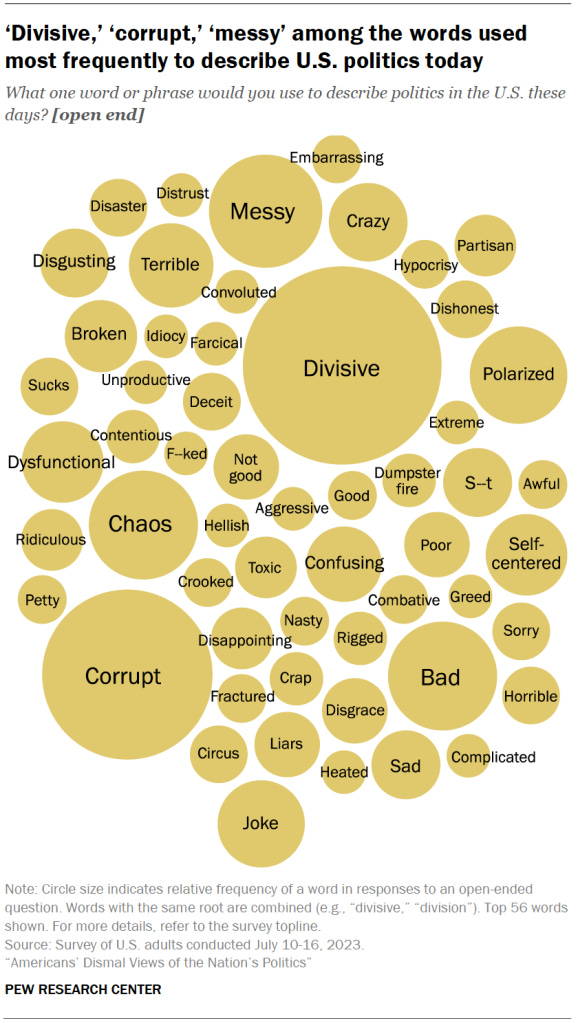What Americans Think About Political Parties and Politics
Healthy democracies require civic participation. But what happens to a democratic nation that despises politics?
Pew Research Center has new survey data on Americans views of political parties and politics. You'll be unsurprised to learn that we're not keen on either.
The word cloud above was created with responses to an open-ended question: "What one word or phrase would you use to describe politics in the U.S. these days?" The larger the circle, the more frequent the response. The most frequent responses were "divisive" and "corrupt." Also, there's "crazy," "messy," "sad," "terrible," and just plain "bad." There's even a cuss word in there.
Some other findings:
65% answered they are always or often exhausted when thinking about politics.
84% say political debate has become less respectful, and this number doesn't change much based on political party (bipartisan agreement!)
78% said too little attention is paid to important issues facing the country.
57% said too much attention is paid to disagreements between Republicans and Democrats.
28% hold an unfavorable view of both parties, the highest it has been since Pew started polling that question in 1994 (when it was only 6%).
Of course, all these problems are due to our political leadership, right? I mean, who put those people in charge anyway? Wait a sec, we did! So, are we the source of the problem? Yes, partly, but not always.
First, sometimes we vote for politicians that seem like a good choice at the time but turn out to be real duds. Maybe New Jersey voters feel that way about US Senator Bob Menendez this week after he was indicted for accepting bribes, including cash, luxury goods, and $100,000 worth of gold bars. Second, as I wrote about last week, there may be some political reforms we should consider that would make our democracy more stable. And third, some people have more influence on our dismal politics than the average voter. I was reminded of that this week with the news that Rupert Murdoch is handing over leadership of Fox News to his son, Lachlan. That network, for example, and choices made by Murdoch, contributed much to the coarsening of our politics and to turning the Republican Party into an unprincipled rage machine.
But let us refocus our attention on what we can do. This includes how we vote for political offices, of course, but also how we "vote" with our time and attention. Every divisive social media post we "like" is to the algorithms a "vote" for more of that. Every divisive news program we watch or listen to is to network owners a "vote" for more of that. And in our personal relationships, we can contribute to the problem or we can help to build a civil society by demonstrating how to disagree well and still be friends.
Events
Join us on zoom!
Next Thursday, Sep. 28, at 8pm eastern, American Values Coalition will have zoom call for our supporters to announce some exciting upcoming events and resources we have planned. You'll also get to hear our guest speaker Kaitlyn Schiess talk about her new book, The Ballot and the Bible: How Scripture Has Been Used and Abused in American Politics*.
We are in need of volunteers to help expand our work, so please come and learn how you can help.
Protecting Places of Worship
FEMA is offering online workshops to help places of worship with active shooter preparedness. The next workshop is Sep 27, 11-1pm eastern.
What Else We're Reading
"What I saw at the Texas border shocked me"
On Texas Governor Greg Abbott's inhumane treatment of migrants at the border:
On a blisteringly hot Wednesday morning, I saw asylum-seeking families — including at least four babies — stuck on the Texas side of the river under rows of concertina razor wire. One woman was vomiting due to dehydration, while a male companion offered her water from the muddy Rio Grande. Heavily armed Texas and Nebraska National Guard members looked on, but refused repeated requests to give them water for more than an hour.
"How GOP pressured Texas senators over Paxton's impeachment trial"
Axios has a behind-the-scenes look at how Texas Attorney General Ken Paxton survived his impeachment trial.
How it worked: Steve Bannon was a big Paxton backer on his WarRoom podcast.
Turning Point USA's Charlie Kirk was vital, the strategist said: "He had his people posting senators' office numbers and was giving them out on his show. Driving the senators absolutely crazy."
A few days before the vote, Trump called Paxton "one of the TOUGHEST & BEST Attorney Generals in the Country" and after the vote, Trump congratulated Paxton on his "Texas sized VICTORY."
A day earlier, Paxton posted: "I'm heading to Maine next week to sit down with @TuckerCarlson."
Lt. Gov. Dan Patrick, also a Trump ally who presided over the trial, received $3 million this summer from a pro-Paxton group called Defend Texas Liberty PAC.
"Trump Attacked Me. Then Musk Did. It Wasn’t an Accident."
How MAGA's online attack mob works:
The timing of the campaign targeting me and my alleged bias suggested the attacks were part of a well-planned strategy. Academic studies have repeatedly pushed back on claims that Silicon Valley platforms are biased against conservatives. But the success of a strategy aimed at forcing social media companies to reconsider their choices may not require demonstrating actual wrongdoing. As the former Republican Party chair Rich Bond once described, maybe you just need to “work the refs”: repeatedly pressure companies into thinking twice before taking actions that could provoke a negative reaction. What happened to me was part of a calculated effort to make Twitter reluctant to moderate Mr. Trump in the future and to dissuade other companies from taking similar steps.
It worked. As violence unfolded at the Capitol on Jan. 6, Jack Dorsey, then the C.E.O. of Twitter, overruled Trust and Safety’s recommendation that Mr. Trump’s account should be banned because of several tweets, including one that attacked Vice President Mike Pence. He was given a 12-hour timeout instead (before being banned on Jan. 8). Within the boundaries of the rules, staff members were encouraged to find solutions to help the company avoid the type of blowback that results in angry press cycles, hearings and employee harassment. The practical result was that Twitter gave offenders greater latitude: Representative Marjorie Taylor Greene was permitted to violate Twitter’s rules at least five times before one of her accounts was banned in 2022. Other prominent right-leaning figures, such as the culture war account Libs of TikTok, enjoyed similar deference.
*Amazon affiliate links support the work of AVC.







